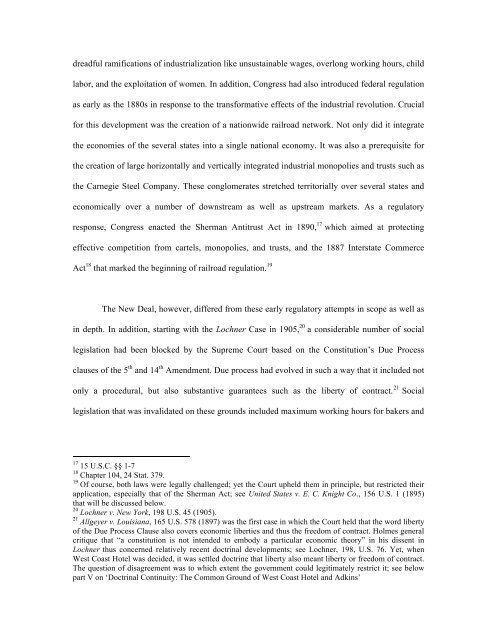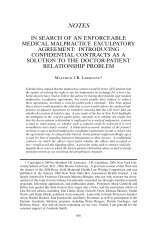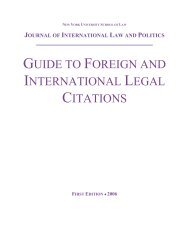Jasper Finke, Crisis and Law - New York University School of Law
Jasper Finke, Crisis and Law - New York University School of Law
Jasper Finke, Crisis and Law - New York University School of Law
Create successful ePaper yourself
Turn your PDF publications into a flip-book with our unique Google optimized e-Paper software.
dreadful ramifications <strong>of</strong> industrialization like unsustainable wages, overlong working hours, child<br />
labor, <strong>and</strong> the exploitation <strong>of</strong> women. In addition, Congress had also introduced federal regulation<br />
as early as the 1880s in response to the transformative effects <strong>of</strong> the industrial revolution. Crucial<br />
for this development was the creation <strong>of</strong> a nationwide railroad network. Not only did it integrate<br />
the economies <strong>of</strong> the several states into a single national economy. It was also a prerequisite for<br />
the creation <strong>of</strong> large horizontally <strong>and</strong> vertically integrated industrial monopolies <strong>and</strong> trusts such as<br />
the Carnegie Steel Company. These conglomerates stretched territorially over several states <strong>and</strong><br />
economically over a number <strong>of</strong> downstream as well as upstream markets. As a regulatory<br />
response, Congress enacted the Sherman Antitrust Act in 1890, 17 which aimed at protecting<br />
effective competition from cartels, monopolies, <strong>and</strong> trusts, <strong>and</strong> the 1887 Interstate Commerce<br />
Act 18 that marked the beginning <strong>of</strong> railroad regulation. 19<br />
The <strong>New</strong> Deal, however, differed from these early regulatory attempts in scope as well as<br />
in depth. In addition, starting with the Lochner Case in 1905, 20 a considerable number <strong>of</strong> social<br />
legislation had been blocked by the Supreme Court based on the Constitution’s Due Process<br />
clauses <strong>of</strong> the 5 th <strong>and</strong> 14 th Amendment. Due process had evolved in such a way that it included not<br />
only a procedural, but also substantive guarantees such as the liberty <strong>of</strong> contract. 21 Social<br />
legislation that was invalidated on these grounds included maximum working hours for bakers <strong>and</strong><br />
17 15 U.S.C. §§ 1-7<br />
18 Chapter 104, 24 Stat. 379.<br />
19 Of course, both laws were legally challenged; yet the Court upheld them in principle, but restricted their<br />
application, especially that <strong>of</strong> the Sherman Act; see United States v. E. C. Knight Co., 156 U.S. 1 (1895)<br />
that will be discussed below.<br />
20 Lochner v. <strong>New</strong> <strong>York</strong>, 198 U.S. 45 (1905).<br />
21 Allgeyer v. Louisiana, 165 U.S. 578 (1897) was the first case in which the Court held that the word liberty<br />
<strong>of</strong> the Due Process Clause also covers economic liberties <strong>and</strong> thus the freedom <strong>of</strong> contract. Holmes general<br />
critique that “a constitution is not intended to embody a particular economic theory” in his dissent in<br />
Lochner thus concerned relatively recent doctrinal developments; see Lochner, 198, U.S. 76. Yet, when<br />
West Coast Hotel was decided, it was settled doctrine that liberty also meant liberty or freedom <strong>of</strong> contract.<br />
The question <strong>of</strong> disagreement was to which extent the government could legitimately restrict it; see below<br />
part V on ‘Doctrinal Continuity: The Common Ground <strong>of</strong> West Coast Hotel <strong>and</strong> Adkins’
















